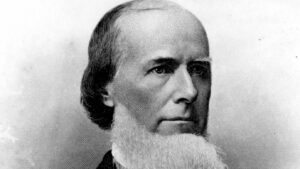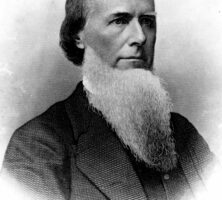The New Georgia Encyclopedia is supported by funding from A More Perfect Union, a special initiative of the National Endowment for the Humanities.
A sleeping ward at Milledgeville State Hospital for the Insane, circa 1940. Authorities at the hospital practiced compulsory sterilization of patients throughout the 1940s and 1950s. Following an award-winning 1959 report by Atlanta Constitution Jack Nelson, the number of operations dropped dramatically before finally ceasing in 1963.
Courtesy of Special Collections & Archives, Georgia State University Library, Atlanta Journal-Constitution Photographic Archive .
The New Georgia Encyclopedia does not hold the copyright for this media resource and can neither grant nor deny permission to republish or reproduce the image online or in print. Requests for permission to publish or reproduce the resource should be submitted to Special Collections and Archives at Georgia State University.
Francis Galton was an English statistician whose theories on heredity lead him to develop the field of eugenics. During the early twentieth century, Galton's ideas gained support among scientific and medical professionals, politicians, and Progressive-era reform groups.
Image from Eveleen Myers
The New Georgia Encyclopedia does not hold the copyright for this media resource and can neither grant nor deny permission to republish or reproduce the image online or in print. All requests for permission to publish or reproduce the resource must be submitted to the rights holder.
This tinted postcard of the Georgia State Sanitarium (later Central State Hospital) depicts the grounds of the institution circa 1905. During this time the hospital was under the leadership of Theophilus O. Powell, who implemented more precise methods of diagnosis.
Courtesy of Melinda Smith Mullikin, New Georgia Encyclopedia
The New Georgia Encyclopedia does not hold the copyright for this media resource and can neither grant nor deny permission to republish or reproduce the image online or in print. All requests for permission to publish or reproduce the resource must be submitted to the rights holder.
Women in Gwinnett County demonstrate in favor of the Nineteenth Amendment to the U.S. Constitution, which guaranteed women the right to vote. The amendment passed in 1920.
Courtesy of Georgia Archives, Vanishing Georgia, # gwn151b.
The New Georgia Encyclopedia does not hold the copyright for this media resource and can neither grant nor deny permission to republish or reproduce the image online or in print. Requests for permission to publish or reproduce the resource should be submitted to the Georgia Archives.
Frances Pauley attends a banquet of the Atlanta branch of the Urban League (AUL) in 1961. Pauley served on the board of the AUL and was president of the Georgia League of Women Voters during the 1950s.
The New Georgia Encyclopedia does not hold the copyright for this media resource and can neither grant nor deny permission to republish or reproduce the image online or in print. For more information about this resource, contact the Stuart A. Rose Manuscript, Archives, and Rare Book Library at Emory University.
A University of North Carolina sociologist, Howard W. Odum was one of the founders of the Southern Regional Council. Previously, he had been the president of the Commission on Interracial Cooperation.
Courtesy of Odum Institute for Research in Social Science, University of North Carolina at Chapel Hill
The New Georgia Encyclopedia does not hold the copyright for this media resource and can neither grant nor deny permission to republish or reproduce the image online or in print. All requests for permission to publish or reproduce the resource must be submitted to the rights holder.
Lillian Smith, pictured in 1945, refused to join the Southern Regional Council because she believed the organization should make the ending of segregation its top priority. She and Howard W. Odum held opposing views about the approach the council should take to achieve necessary reforms.
Courtesy of Georgia Archives, Vanishing Georgia, #
rab360.
The New Georgia Encyclopedia does not hold the copyright for this media resource and can neither grant nor deny permission to republish or reproduce the image online or in print. Requests for permission to publish or reproduce the resource should be submitted to the Georgia Archives.
The Civil War governor of Georgia, Joseph E. Brown was one of the most successful politicians in the state's history. A member of the Bourbon Triumvirate, Brown served as a U.S. senator from 1880 to 1890.
The New Georgia Encyclopedia does not hold the copyright for this media resource and can neither grant nor deny permission to republish or reproduce the image online or in print. Requests for permission to publish or reproduce the resource should be submitted to the Hargrett Manuscript and Rare Book Library at the University of Georgia.
Alfred H. Colquitt, a member of the Bourbon Triumvirate, was elected governor of Georgia in 1876. Although his tenure was marked by controversial finances and other scandals, Colquitt is credited with advocating industrialization in the state as a means of recovering from the economic hardships of the Civil War.
From The History of the State of Georgia, by I. W. Avery
The New Georgia Encyclopedia does not hold the copyright for this media resource and can neither grant nor deny permission to republish or reproduce the image online or in print. All requests for permission to publish or reproduce the resource must be submitted to the rights holder.
John B. Gordon, a renowned Confederate officer and political leader, was a member of the Farmers' Alliance in Georgia until the organization's split with the Democratic Party in 1892. A member of the Bourbon Triumvirate, Gordon served multiple terms in the U.S. Senate and, from 1886 to 1890, as governor of the state.
Courtesy of Library of Congress, Prints and Photographs Division, Brady-Handy Photograph Collection.
The New Georgia Encyclopedia does not hold the copyright for this media resource and can neither grant nor deny permission to republish or reproduce the image online or in print. All requests for permission to publish or reproduce the resource must be submitted to the rights holder.
Two African American men fill in their ballots at Forest Avenue School during a 1946 election. During that same year, the Atlanta Urban League registered 14,368 Black voters within a two-month period.
Courtesy of Special Collections & Archives, Georgia State University Library, Lane Brothers Commercial Photographers Photographic Collection.
The New Georgia Encyclopedia does not hold the copyright for this media resource and can neither grant nor deny permission to republish or reproduce the image online or in print. Requests for permission to publish or reproduce the resource should be submitted to Special Collections and Archives at Georgia State University.
Black voters in Georgia present their ballots to an election worker on June 3, 1946. The political mobilization effort of African Americans in the state has continued, through the efforts of many organizations, from the 1930s to the present.
Courtesy of Special Collections & Archives, Georgia State University Library, Lane Brothers Commercial Photographers Photographic Collection.
The New Georgia Encyclopedia does not hold the copyright for this media resource and can neither grant nor deny permission to republish or reproduce the image online or in print. Requests for permission to publish or reproduce the resource should be submitted to Special Collections and Archives at Georgia State University.
Despite Governor Eugene Talmadge's determination to block equality at the polls for the state's Black citizens, a federal court declared the white primary in Georgia unconstitutional in King v. Chapman (1946).
Courtesy of Special Collections & Archives, Georgia State University Library, Lane Brothers Commercial Photographers Photographic Collection.
The New Georgia Encyclopedia does not hold the copyright for this media resource and can neither grant nor deny permission to republish or reproduce the image online or in print. Requests for permission to publish or reproduce the resource should be submitted to Special Collections and Archives at Georgia State University.
African American voters in Georgia wait to enter a polling facility in 1946. Since the passage of the Voting Rights Act of 1965, many Black officials have been elected to office on both the state and federal levels.
Courtesy of Special Collections & Archives, Georgia State University Library, Lane Brothers Commercial Photographers Photographic Collection.
The New Georgia Encyclopedia does not hold the copyright for this media resource and can neither grant nor deny permission to republish or reproduce the image online or in print. Requests for permission to publish or reproduce the resource should be submitted to Special Collections and Archives at Georgia State University.
The New Georgia Encyclopedia does not hold the copyright for this media resource and can neither grant nor deny permission to republish or reproduce the image online or in print. All requests for permission to publish or reproduce the resource must be submitted to the rights holder.
As chair of the Atlanta All-Citizens Registration Committee in 1946, Clarence A. Bacote (right) increased the number of Black registered voters in Atlanta from 6,976 to 21,244.
The New Georgia Encyclopedia does not hold the copyright for this media resource and can neither grant nor deny permission to republish or reproduce the image online or in print. All requests for permission to publish or reproduce the resource must be submitted to the Atlanta University Center Robert W. Woodruff Library and Archives Research Center.
Leroy Johnson desegregated the Georgia General Assembly when he won his seat in 1962 and went on to become one of Georgia's most powerful state senators. During his tenure, Johnson revised the literacy test for voting rights, making voting more accessible to all citizens of Georgia.
Courtesy of Georgia Capitol Museum, University of Georgia Libraries
The New Georgia Encyclopedia does not hold the copyright for this media resource and can neither grant nor deny permission to republish or reproduce the image online or in print. All requests for permission to publish or reproduce the resource must be submitted to the rights holder.
South Carolina governor Strom Thurmond speaks at the Democratic National Convention in Philadelphia in July 1948. Thurmond would head the Dixiecrat ticket opposing the Democrats shortly after the convention ended.
Courtesy of the Strom Thurmond Institute of Government and Public Affairs, Clemson University
The New Georgia Encyclopedia does not hold the copyright for this media resource and can neither grant nor deny permission to republish or reproduce the image online or in print. All requests for permission to publish or reproduce the resource must be submitted to the rights holder.
South Carolina governor Strom Thurmond in his office in 1948. Thurmond ran for U.S. president on the Dixiecrat ticket in 1948.
Courtesy of the Strom Thurmond Institute of Government and Public Affairs, Clemson University
The New Georgia Encyclopedia does not hold the copyright for this media resource and can neither grant nor deny permission to republish or reproduce the image online or in print. All requests for permission to publish or reproduce the resource must be submitted to the rights holder.
Residents of Ellaville gather downtown for a springtime celebration. The Schley County Courthouse is visible in the background.
Courtesy of The Tri-County Journal
The New Georgia Encyclopedia does not hold the copyright for this media resource and can neither grant nor deny permission to republish or reproduce the image online or in print. All requests for permission to publish or reproduce the resource must be submitted to the rights holder.
The Reverend Martin Luther King Sr. stands outside Ebenezer Baptist Church, where he was pastor for several decades, in 1981.
Courtesy of Atlanta Journal-Constitution.
The New Georgia Encyclopedia does not hold the copyright for this media resource and can neither grant nor deny permission to republish or reproduce the image online or in print. All requests for permission to publish or reproduce the resource must be submitted to the Atlanta Journal-Constitution.
King's interest in nonviolence became a central tenet of his leadership of the Southern Christian Leadership Conference and helped lead a young generation of African Americans to promote desegregation through peaceful sit-ins.
Courtesy of Atlanta History Center.
The New Georgia Encyclopedia does not hold the copyright for this media resource and can neither grant nor deny permission to republish or reproduce the image online or in print. Requests for permission to publish or reproduce the resource should be submitted to the Atlanta History Center.
Andrew Young has had a distinguished career as a minister, civil rights activist, U.S. congressman, United Nations ambassador, mayor of Atlanta, and international businessman.
Courtesy of Library of Congress, Prints and Photographs Division
The New Georgia Encyclopedia does not hold the copyright for this media resource and can neither grant nor deny permission to republish or reproduce the image online or in print. All requests for permission to publish or reproduce the resource must be submitted to the rights holder.
The New Georgia Encyclopedia does not hold the copyright for this media resource and can neither grant nor deny permission to republish or reproduce the image online or in print. All requests for permission to publish or reproduce the resource must be submitted to the rights holder.
The Atlanta Negro Voters League was a bipartisan political organization started by Black leaders in 1949 to form a united front to maximize the strength of the Black vote. The group used the Butler Street YMCA as its headquarters.
The New Georgia Encyclopedia does not hold the copyright for this media resource and can neither grant nor deny permission to republish or reproduce the image online or in print. All requests for permission to publish or reproduce the resource must be submitted to the rights holder.
Register now. Registration does not cost a penny. A flyer for the Atlanta Negro Voters League urges Blacks to "Register yourself! Take another one with you."
The New Georgia Encyclopedia does not hold the copyright for this media resource and can neither grant nor deny permission to republish or reproduce the image online or in print. All requests for permission to publish or reproduce the resource must be submitted to the Atlanta University Center Robert W. Woodruff Library and Archives Research Center.
A flyer for the Atlanta Negro Voters League instructs voters: "To vote for bonds on May 15 pull down down levers over 'For.'"
The New Georgia Encyclopedia does not hold the copyright for this media resource and can neither grant nor deny permission to republish or reproduce the image online or in print. All requests for permission to publish or reproduce the resource must be submitted to the Atlanta University Center Robert W. Woodruff Library and Archives Research Center.
Attorney A. T. Walden, a key participant in the effort to increase Black voter registration during the 1940s, served as one of the first cochairs of the Atlanta Negro Voters League executive committee.
Courtesy of Archives Division, Auburn Avenue Research Library on African American Culture and History, Atlanta–Fulton Public Library System
The New Georgia Encyclopedia does not hold the copyright for this media resource and can neither grant nor deny permission to republish or reproduce the image online or in print. All requests for permission to publish or reproduce the resource must be submitted to the rights holder.



































